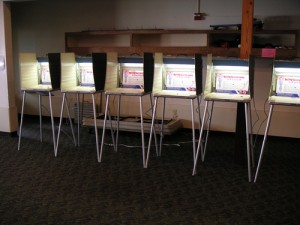It’s Not The Size Of The Latino Electorate That Matters
 All of the punditry and political posturing, all of the urgency and calls for action, all of the outrage and tacit and direct messages sent will be for naught if on election day Latinos don’t show up to vote. It really is as simple as that. Sitting-out this presidential election in protest over a lack of suitable candidates does no one any good. In fact, we should name the thing we’re talking about: a protest no-vote amounts to nothing more than a cop-out.
All of the punditry and political posturing, all of the urgency and calls for action, all of the outrage and tacit and direct messages sent will be for naught if on election day Latinos don’t show up to vote. It really is as simple as that. Sitting-out this presidential election in protest over a lack of suitable candidates does no one any good. In fact, we should name the thing we’re talking about: a protest no-vote amounts to nothing more than a cop-out.
For Latinos the test begins Tuesday, January 31 — the day of the Florida presidential primary. It’s the first state-level presidential contest where Latinos’ sizable voting numbers matter enough to make a difference. Florida has the third-largest Latino population in the nation, more than 4.2 million.
And I’ll beat this dying horse one more time: the numbers don’t matter if the voters don’t vote. With that said, here’s a quick overview of the Latino vote in Florida, as reported by the Pew Hispanic Center:
- 1,473,920 Latinos are registered to vote statewide,
- making up 13.1% of the state’s more than 11.2 million registered voters.
- Among Latino registered voters, 452,619 are registered as Republicans
- representing 11.1% of all Republican registered voters.
- 564,513 Latino registered voters are registered as Democrats
- representing 12.4% of all Democratic registered voters.
The Pew statistics go deeper into Florida’s Latino voter numbers (education, income levels, eligible voters, etc.), but while they paint a interesting picture, they don’t foretell how many will or won’t vote. They don’t speak to barriers, institutional or social, that hinder voter participation.
For instance, in Texas, with one of the largest Latino populations in the country, an unfunded mandate by the Republican-led administration will have a definite and detrimental effect on Latino voting. Gloria Padilla, of the San Antonio Express-News, reported that in an effort to cut costs Texas’ Secretary of State will only print a limited number of voter registration cards — local goverments must pick up the cost of printing more. So there’s only a finite number of material to register a smaller number of voters in a state where Latinos are a young and burgeoning portion of the electorate. This had never been a problem before, and now it matters? To be fair, the Texas Secretary of State is stuck between a budget and the post office. Padilla writes:
One reason the secretary of state is getting out of the business of providing the forms is the United States Postal Service is no longer allowing the office to use a business reply permit without pre-addressing the application.
So now the local election administrations must print their voter registration cards, including the local return address, in an effort to increase efficiency. But with local-level budgets being what they are, don’t be surprised if there’s a voter registration card scarcity in the run-up to the presidential election. And that means there will be less of an opportunity for young , new and first time voters to register.
Votes matter more than statistics, so we’ll be keeping a close eye on voter turn out trends as the primaries in Latino-heavy states get started. First up, of course, is Florida — an atypical Latino population, but nuanced nonetheless where redistricting, voter ID, intimidation and other shenanigans are not out of the question.
We’ll have a better idea if and how the Latino voters showed up in Florida on February 1. We’ll keep you posted.
[Photo By eyspahn]
